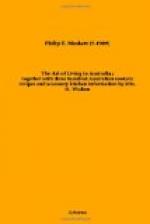But far better than all this eagerness to amass wealth by some fortunate Coup, would be the natural development of the country. Agriculture and market-gardening, vine-growing and wine-making, the deep-sea fisheries and all the other comparatively neglected opportunities, only await their expansion into vast sources of wealth. What wonder, then, that a continent with so much that is wanting in connection with its food life should be living in a manner distinctly opposed to its climatological necessities! In the case of America there is a far different history. Settlement began there in a small way at first, to gradually expand as time went on. There was no sudden event, with the exception of the short-lived Californian gold rush of 1849-50, to set men flocking to its shores in countless legions. No, in America the inland territory has been peopled, steadily and slowly at first, but in after years by leaps and bounds, so that its development has been on a perfectly natural basis.
But there must be something even more than this to explain the want of adaptation to climate shown in Australia, and it is, I think, to be found in the following. It must be remembered that Australia has been peopled chiefly by the Anglo-Saxon race. In such a stock the traditional tendencies are almost ineradicable, and hence it is that the descendants of the new comers believe as their fathers, did before them. It’s in the blood. For there can be no doubt but that the Anglo-Saxon thinks there is only one way of living in every part of the world—no matter whether the climate be tropical, semi-tropical, or frigid. Those in the old country live in a certain manner, and all the rest of the globe have every right to follow their example.
These two facts that Australia was peopled in part by the influx which followed the discovery of gold, and that its inhabitants belong essentially to the Anglo-Saxon race, have unquestionably exercised a great influence over our Australian food-habits. But notwithstanding these powerful underlying factors, there still remains that most extraordinary circumstance, to which I at first referred, namely, that the Australian




